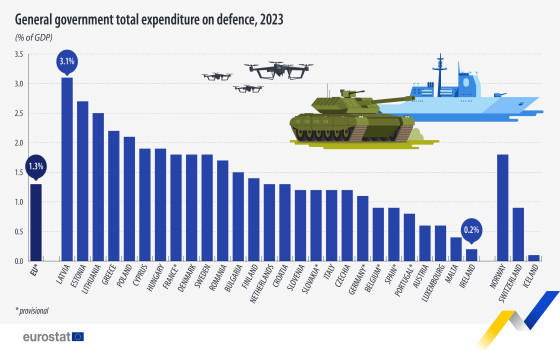
Veterans are leading the defense technology revolution in Europe. With investments exceeding $5 billion, to meet the needs of the war in Ukraine, European defense spending totals $446 billion.

- Europe and Arabs
- Friday , 5 September 2025 10:45 AM GMT
Brussels: Europe and the Arabs
With record investments exceeding $5 billion by 2024, European veterans are leading defense technology startups, leveraging their field experience to develop solutions that meet the needs of battlefields in Ukraine.
With the escalation of the war in Ukraine and the increase in NATO budgets, European veterans have become a key player in defense technology development, contributing their field experience to transform startups into rapid innovation platforms capable of meeting the needs of modern warfare. According to a report by the Brussels-based Euronews website, and added under the title: Military Experience Turns Ideas into Practical Solutions, "When former German army officer Matt Kupers evaluated an Austrian startup's anti-drone weapon system, he noticed something the civilian founders overlooked: the gun barrel overheating after repeated use, leading to a loss of accuracy. Kupers explained that these small details are crucial, as an experienced soldier automatically adjusts his aim to avoid mistakes."
Analysis shows that veterans lead a quarter of European defense startups, while the majority of CEOs of major companies have no military experience.
Record Investments as Startups Take Off
The war in Ukraine and increased spending by European countries have pushed defense sector investments to unprecedented levels. Venture capital investments in defense technology startups reached $5.2 billion in 2024, a more than fivefold increase compared to pre-war levels.
The European defense sector is witnessing ex-soldiers joining startups at an unprecedented speed, leveraging their field experience and understanding of needs. The military, including military procurement and field planning. Experts have confirmed that having firsthand military experience within startups makes products more reliable and effective on the battlefield.
The war in Ukraine has helped reduce technology development timeframes from years to weeks, allowing veteran-led startups to rapidly develop innovative defense solutions.
Among the most notable of these companies are:
A high-performance drone manufacturer founded by a former officer; a battle planning software developer led by a British Army officer; and a military training equipment manufacturer run by former soldiers from Norway.
The founder of a Ukrainian drone company says, "Soldiers see firsthand what solutions are missing on the battlefield, and they have a deep understanding of what works and what is just hype."
In practice, experience has shown that unreliable products can cost millions of euros for no apparent reason, underscoring the need for firsthand military experience within startups to develop proven and effective solutions.
As defense budgets increase, the role of veterans in Europe is expected to continue to grow as founders, advisors, and innovators who ensure that new defense technology is proven and delivers results. Its objectives.
Experts confirm that the combination of military expertise, innovation, and investment puts Europe in a leading position to develop innovative defense solutions.
In 2024, the EU-27's total defense spending reached €343 billion (approximately $402 billion), a 19% increase over the previous year, marking the tenth consecutive year of increased defense budgets.
Spending is expected to rise to €381 billion ($446 billion) in 2025, more than double the 2014 defense budget of €189 billion.
According to the Stockholm International Peace Research Institute (SIPRI), European spending in 2024 will exceed China's budget by nearly 50% and is more than three times that of Russia, but it is still less than the United States, which spent €845 billion ($983 billion), equivalent to 3.1% of its GDP.
Despite the large total spending, military spending varies significantly among member states; Poland reaches €1.5 billion. 3.8% of GDP is the highest in the European Union, with the three Baltic states exceeding 3%, while Germany, France, Finland, Romania, Hungary, the Czech Republic, and Sweden exceed 2%, while Ireland and Malta recorded less than 0.5%, the lowest rate ever.
More than 10 countries saw their defense budgets increase by more than 10% compared to 2023, including Spain, Germany, the Netherlands, Croatia, Sweden, Austria, Poland, the Czech Republic, Latvia, Estonia, Lithuania, and Romania.
Strengthening Individual Force and Defense Investment
The increase in spending was not limited to overall budgets but also included investment in soldiers, military procurement, and research and development.
In 2024, defense spending per active military personnel reached €249,000 ($289,500), up from €138,000 in 2014. Defense spending per civilian person also rose to €764. Euro ($888).












No Comments Found